#Rikki Schlott
Explore tagged Tumblr posts
Text

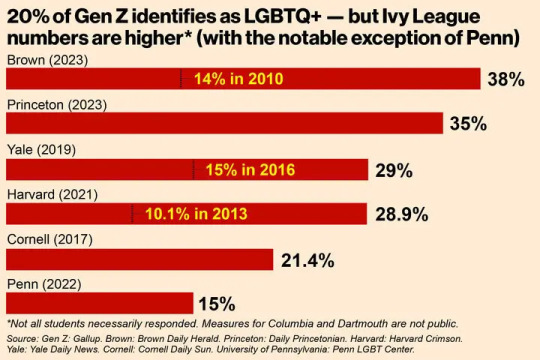
By: Rikki Schlott
Published: July 20, 2023
While just 7% of Americans are LGBTQ+, students at Ivy League universities are identifying as non-straight at rates as much as five times the general public.
Brown University made headlines after a student poll revealed a whopping 38% of their student body is not straight.
“Honestly I’m not surprised by that statistic,” an anonymous senior at Brown University told The Post. “At Brown, there’s no social pressure to fit into a box or hide your identity.”
Other Ivies aren’t far behind. In fact, more than a third of students at Princeton and more than a quarter at Yale and Harvard identify as LGBTQ+, as per recent polling — and campus sources chalk it up, in part, to politics and a desire to join an “oppressed” group.”
According to the Census Bureau, 20% of Gen Z is LGBTQ+, far more than older cohorts. But Ivy League students far outstrip their generation as a whole.
According to Abigail Anthony, who graduated from Princeton University with a degree in politics this year, a progressive and identity-consumed culture on elite campuses could be contributing.

[ Ivy League schools have much larger proportions of LGBTQ+ students than the general population. ]
“Since sexual orientation identity is largely non-falsifiable, many people will claim LGBTQ status to join the ‘oppressed’ group,” she told The Post.
According to a Princeton student newspaper survey, 35% of the 2023 graduating class identified as something other than straight.
“It could be that students at elite schools are more inclined to be obsessed with social acceptance and professional advancement, and … profess an LGBTQ identity to indicate their political beliefs on a campus that leans left,” she added.
At schools for which historical data is available, the proportion of students who are not straight is skyrocketing. Brown jumped from 14% in 2010 up to 38% this year.
Some 29% of Yale’s class of 2023 identified as something other than heterosexual when they were surveyed as freshmen in 2019. That’s up from just 15% of the class of 2020 when they were asked by the school paper in 2016.
And the proportion of LGBTQ+ students at Harvard tripled over the last decade, from 10% of incoming freshmen in 2013 to 29% in 2021.
The most recent data from Cornell comes from 2017, when 21.4% of freshmen were LGBTQ+. The University of Pennsylvania is an outlier, at just 15% as of 2022.
Ben Appel, 40, finished his undergraduate degree in 2020 as an adult student at Columbia’s General Studies program. And, although he is gay himself, he said his Gen Z classmates were markedly more likely to identify as “queer.”

[ A student newspaper poll found that the number of students at Brown who are LGBTQ+ jumped from 14% in 2010 up to 38% this year. ]
“Queer is as much politics as it is a sexual identity. Maybe even more so,” Appel, author of the forthcoming book “Cis White Gay: The Making of a Gender Heretic,” told The Post. “The Ivies have a lot of really privileged kids. I’m sure many are motivated to identify into a so-called marginalized community in order to earn some social cache.”
He thinks a growing number of amorphous labels allow more people to fall under the LGBT umbrella than ever before.
“The ‘trans’ and ‘queer’ umbrellas have expanded to include gender-nonconforming people and even people who would normally be considered straight,” Appel noted.

[ The share of heterosexual students at Brown dropped by 25.2% between 2010 and 2023. ]
Anthony agrees: “In some instances, a straight person will identify as bisexual but simply continue dating the opposite sex.”
Although Columbia hasn’t published similar figures, Appel and another Columbia graduate both estimate they are in line with other Ivy League schools.
“It’s becoming a majority,” an anonymous member of Columbia’s class of 2022 observed.
Appel said that Ivy League universities are particularly likely to have curriculum that is fixated on gender and sexuality.
“It makes sense that these polls were taken at Ivy League universities,” he told The Post. “Students take one queer theory course and come out as queer.”
At Princeton this year, 35% of seniors identified as something other than straight, compared with just 25% of incoming freshmen. And nearly one in five Princeton grads this year came out while in college.
Cornell developmental psychology professor and young adult sexuality expert Ritch Savin-Williams believes that Gen Z students are coming out in larger numbers due to increased social acceptance — especially on progressive campuses: “The shift has been in the visibility and the willingness of individuals to express it and to declare it.”
==
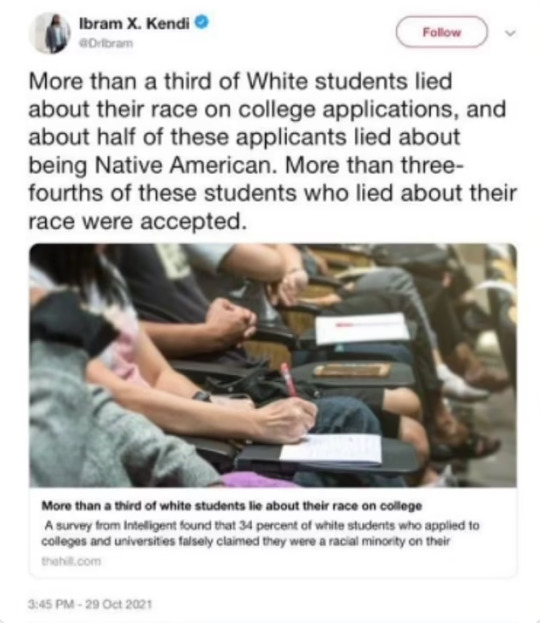
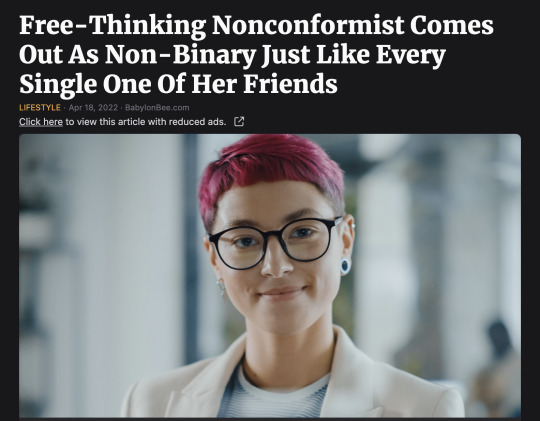
"Show me the incentive and I will show you the outcome." -- Charlie Munger
#Rikki Schlott#LGBTQ+#LGBTQ#intersectionality#oppressor#oppressed#oppressor vs oppressed#queer theory#Ivy League#identity politics#bisexual#religion is a mental illness
25 notes
·
View notes
Text
American progressives seem largely unaware that the views American conservatives espouse—like traditional religious norms, sexual morality, and intergroup loyalty—are actually far more common in the rest of the world. This fact is expertly pointed out in Jonathan Haidt's 2012 masterwork The Righteous Mind. Outside of these myopic urban and academic bubbles in America, progressive ideas are exceptionally rare in the scheme of things. In his 2020 book The WEIRDest People in the World, Harvard evolutionary biologist Joseph Heinrich points out that American progressives are outliers or WEIRDos (Western, educated, industrialized, rich, and democratic) in the scheme of human history and the modern world. There's something obnoxiously small-minded and elitist in the assumption that, just by some strange historical coincidence, you or your group is somehow the first to land on the universal truths of morality. And yet many American progressives seem to at least subconsciously hold this to be self-evident. It's not that morality should be decided by a global majority vote, but a self-awareness of WEIRDness is hugely lacking.
–Greg Lukianoff & Rikki Schlott, The Canceling of the American Mind: Cancel Culture Undermines Trust and Threatens Us All — But There Is a Solution
3 notes
·
View notes
Text
Hofstra University
The 2024 Election & Protecting Our Democracy with David Hogg and Rikki Schlott

Join us in a conversation about the 2024 Election with David Hogg, gun violence prevention activist and survivor of the 2018 Stoneman Douglas High School shooting in Parkland, FL and co-author of #NeverAgain, and Rikki Schlott, New York Post columnist and co-author of The Canceling of the American Mind..
Moderated by: Rosanna Perotti, Professor of Political Science, and Lincoln Anniballi, Class of 2025, President, Hofstra University Student Government Association Select authors' titles will be available for sale and book signing.
Wednesday, October 2, 11:20 a.m.-12:45 p.m. Student Center Theater, Mack Student Center, North Campus
Admission is FREE and open to the public. Advance registration is required. More info and to RSVP visit https://tinyurl.com/yw8atvhp
0 notes
Text
Liked on YouTube: Mike Rowe: The Smartest Dropout I Know is Rikki Schlott | The Way I Heard It
Mike Rowe: The Smartest Dropout I Know is Rikki Schlott | The Way I Heard It On this episode of The Way I Heard It, Mike Rowe talks with Rikki Schlott. The New York Post columnist and author discusses the disruptive and damaging nature of social media, our shortening attention spans, the lack of free speech on college campuses, why the First Amendment is the most important right, why she left NYU…
View On WordPress
0 notes
Text
The 2024 Book List
Fighting for Your Marriage (Howard J. Markman, Scott M. Stanley & Susan L. Blumberg)
Soldier's Heart (Gary Paulsen)
Let Us Now Praise Famous Men (James Agee & Walker Evans) - 1K List: 1/year, 139/total
A Matter of Principle (Susan Beth Pfeffer)
5 Miraculous Muslims Touched by God (Author Unknown - Presumably Some Christian Organization)
The Woman in Me (Britney Spears)
Cold-Case Christianity (J. Warner Wallace)
Romney: A Reckoning (McKay Coppins) *
Sense and Sensibility (Jane Austen) ; 1K List: 2/year, 140/total
[Audiobook] The Underground Railroad (Colson Whitehead); 1K List: 3/year, 142 total
Opportunity Knocks (Tim Scott)
Why Marriages Succeed or Fail (John Gottman)
How to Know a Person (David Brooks) *
Killing Floor (Lee Child)
They Called Us "Lucky" (Ruben Gallego) *
Acquitted (Kyle Rittenhouse)
Profiles in Courage (John F. Kennedy)
The Case Against the Sexual Revolution (Louise Perry) *
The Things We Cannot Say (Kelly Rimmer) *
Who Killed These Girls? (Beverly Lowry)
Endgame (Omid Scobie)
[Textbook] AHA Heartsaver - First Aid (2021 Student Edition/Workbook)
[Textbook] AHA Heartsaver - First Aid, CPR, AED (2021 Student Edition/Workbook)
[Textbook] AHA BLS Instructor Manual
House of Leaves (Mark Z. Danielewski)
Pride and Prejudice (Jane Austen) ; 1K List: 4/year, 143 total
Social Justice Fallacies (Thomas Sowell)
The Canceling of the American Mind (Greg Lukianoff & Rikki Schlott) *
Lost in Trans Nation (Miriam Grossman, MD)
Bad Therapy (Abigail Shrier) *
Hitler's Pawn (Stephen Koch) *
Rule Number Two (Dr. Heidi Squier Kraft) *
The Exchange (John Grisham)
[Audiobook] Zero Days (Ruth Ware)
Jesus Calling (Sarah Young)
Partners in Power (Roger Morris)
The Iliad (Homer - translated by Emily Wilson) - 1K List: 5/year, 144 total
[Audiobook] The It Girl (Ruth Ware)
In the Country of Men (Hisham Matar)
Get It Together (Jesse Watters)
Say More (Jen Psaki)
The Bible in 52 Weeks (Kimberly D. Moore)
White Rural Rage (Tom Schaller & Paul Waldman)
Prequel (Rachel Maddow)
Mansfield Park (Jane Austen) - 1K List: 6/year, 145 total
Morning After the Revolution (Nellie Bowles)
[Textbook] How to Write Anything - Third Edition (John J. Ruszkiewicz & Jay T. Dolmage)
I Swear (Katie Porter)
[Textbook] Emergency Care and Transportation of the Sick and Injured - Twelfth Edition (Andrew Pollack, series editor)
What the Dead Know (Barbara Butcher)
Unbroken (Laura Hillenbrand)
The Situation Room (George Stephanopoulos)
King (Jonathan Eig) *
The Making of a King (Robert Hardman)
Troubled (Rob Henderson) *
If You Didn't Write It Down, It Never Happened! (Paul Serino)
Emma (Jane Austen) - 1K List: 7/year, 146 total
Elon Musk (Walter Isaacson)
The Fred Factor (Mark Sanborn)
A Coffin For Dimitrios (Eric Ambler) - 1K List: 8/year, 147 total
Privacy Is Power (Carissa Veliz)
[Textbook] Foundations of Education - Third Edition (NAEMSE)
Effective Difficult Conversations (Catherine Soehner & Ann Darling)
Foundation (Isaac Asimov) - 1K List: 9/year, 148 total
[Audiobook] Foundation and Empire (Isaac Asimov) - 1K List: 10/year, 149 total
Book Club Reboot (Sarah Ostman & Stephanie Saba)
Emotional Intelligence 2.0 (Travis Bradberry & Jean Greaves)
Kissing Girls On Shabbat (Sara Glass)
Lucky Jim (Kingsley Amis) - 11/y, 150/t
The Power of TED (David Emerald)
Fight Like A Girl (Kate Germano)
Second Foundation (Isaac Asimov) - 12/y, 151/t
God and the Gay Christian (Matthew Vines)
Dereliction of Duty (H.R. McMaster)
Old Herbaceous (Reginald Arkell) - 13/y, 152/t
Introverts in Love (Sophia Dembling)
Catechism of the Catholic Church (Ascension Edition)
Don't Burn This Book (Dave Rubin)
Raising Them Right (Kyle Spencer)
The Great Adventure Catholic Bible (Ascension Press)
1 note
·
View note
Text
Η σημασία της κουλτούρας του ελεύθερου λόγου
Στο νέο τους βιβλίο The Canceling of the American Mind , ο Greg Lukianoff και ο Rikki Schlott παρέχουν αμέτρητα παραδείγματα ανθρώπων που έχουν ακυρωθεί σε όλο το πολιτικό φάσμα – από τα αριστερά, τα δεξιά και παντού ενδιάμεσα. Ακολουθεί μια συνέντευξη με τον Schlott, ο οποίος υποστηρίζει τη σημασία της κουλτούρας της ελευθερίας του λόγου και προτείνει πώς η τριτοβάθμια εκπαίδευση και η ευρύτερη…

View On WordPress
0 notes
Video
youtube
Courage is Contagious: Rikki Schlott on Fighting Back Against Cancel Culture
0 notes
Text
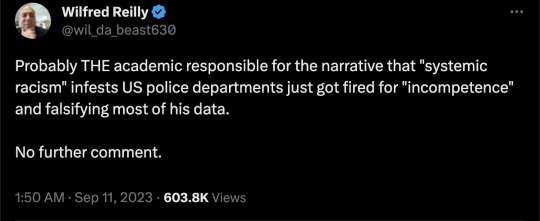

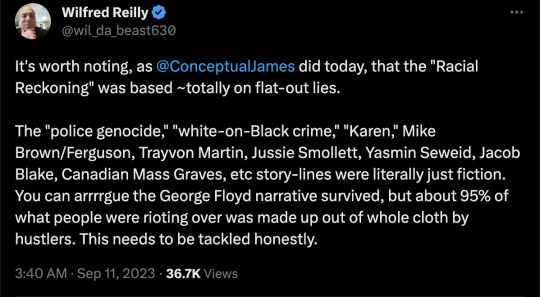
By: Rikki Schlott
Published: Aug 4, 2023
Florida State University criminology professor Eric Stewart was a guru of the claim that “systemic racism” infests America’s police and American society.
Now he’s out of a job on account of “extreme negligence” in his research.
The academic was fired after almost 20 years of his data — including figures used in an explosive study, which claimed the legacy of lynchings made whites perceive blacks as criminals, and that the problem was worse among conservatives — were found to be in question.
College authorities said he was being fired for “incompetence” and “false results.”
Among the studies he has had to retract were claims that whites wanted longer sentences for blacks and Latinos.
To date, six of Stewart’s articles published in major academic journals like Criminology and Law and Society Review between 2003 and 2019 have been fully retracted after allegations the professor’s data was fake or so badly flawed it should not have been published.
The professor’s termination came four years after his former graduate student Justin Pickett blew the whistle on his research.
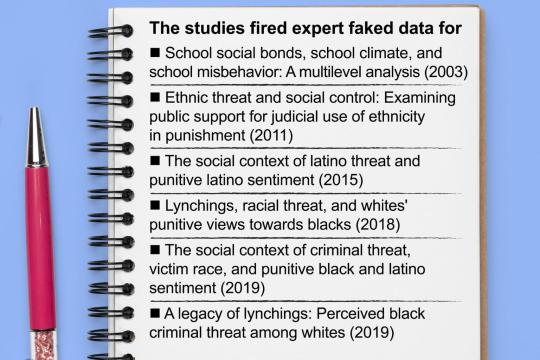
Pickett said they had worked together in 2011 researching whether the public was demanding longer sentences for black and Hispanic criminals as those minority populations grew, with the paper claiming they did. But Stewart had fiddled the sample size to deliver that result when the real research did not, Pickett said.
When the investigation into Stewart began in 2020, he claimed he was the victim and that Pickett “essentially lynched me and my academic character.”
After sixteen years as a professor of criminology at Florida State University in Tallahassee, Provost James Clark formally notified Stewart he was being terminated in a July 13 letter.
“I do not see how you can teach our students to be ethical researchers or how the results of future research projects conducted by you could be deemed as trustworthy,” Clark wrote to Stewart, who has been absent from his role since March.
Clark said as well as the six officially retracted studies, other work by Stewart was “in doubt.”
The retracted studies looked into contentious social issues, like whether the public perceives black and Latino people as threats and the role of racial discrimination in America’s criminal justice system.
One 2019 study,��which has been retracted, suggested historical lynchings make white people today perceive black people as threats.
Stewart floated the idea “that this effect will be greater among whites… where socioeconomic disadvantage and political conservatism are greater.”
Another retracted 2018 study suggested that white Americans view black and Latino people as “criminal threats,” and suggested that perceived threat could lead to “state-spon.sored social control.”
And in a third, Stewart claimed Americans wanted tougher sentences for Latinos because their community was increasing in numbers and becoming more economically successful.

[ Some of Stewart’s research’s flawed data exaggerated the role race plays in the criminal justice system. ]
“Latino population growth and perceived Latino criminal and economic threat significantly predict punitive Latino sentiment,” he concluded in the 2015 study, which has now been retracted.
Stewart’s research also delved into the relationship between incarceration and divorce, street violence, the impact of tough neighborhoods on adolescents, whether street gardens reduce crime, and how race impacts student discipline in schools.
But the disgraced professor was able to rise to prominence as an influencer in his field despite his studies from as early as 2003 now being retracted.
Stewart was a widely-cited scholar, with north of 8,500 citations by other researchers, according to Google Scholar — a measure of his clout as an academic.
He was vice president and fellow at the American Society of Criminology, who honored him as one of four highly distinguished criminologists in 2017.
He was also a W.E.B. DuBois fellow at the National Institute of Justice.
The professor received north of $3.5 million in grant support from major organizations and taxpayer-funded entities, according to his resume.
The Florida Department of Juvenile Justice, the National Science Foundation, which is an arm of the federal government, and the National Institute of Justice, which is run by the Department of Justice, have all funneled money into research Stewart presided over.
The National Institute of Mental Health, a branch of the NIH, poured $3.2 million into research on how African Americans transition into adulthood.
Stewart presided over that initiative as co-principal investigator from 2007 to 2012.
Meanwhile, he reportedly raked in a $190,000 annual salary at FSU, a public university.
While there he served on the school’s diversity, promotion and tenure committees, giving him a say over who got ahead on campus.
He even passed judgment on students accused of cheating and academic dishonesty themselves, as a member of FSU’s Academic Honor Policy Hearing Committee.
The fired professor, 51, graduated from Fort Valley State University and earned his Ph.D. from Iowa State University in 2000.
==
Academic fraud has direct consequences. Aside from improperly obtaining funding, this kind of corruption directly influences society.
The riots had a body count and caused $2b damage, including to minority-owned businesses, many of which ultimately just closed.
Of course, the problem is that the exposure of this fraud won't stop those citing or using his work, since it's been accepted based on "faith" - "even if he got it wrong, I know it's true in my heart."
#Rikki Schlott#Eric Stewart#academic fraud#academic corruption#BLM riots#summer of love#summer of love riots#1619 riots#critical race theory#police#police racism#systemic racism#corruption of education#wokeness#woke#cult of woke#wokeness as religion#racial reckoning#religion is a mental illness
12 notes
·
View notes
Text
If therapists are more concerned with helping you overcome your group privilege than helping you overcome your personal troubles, we've truly reached an abysmal place.
—Greg Lukianoff & Rikki Schlott, The Canceling of the American Mind: Cancel Culture Undermines Trust and Threatens Us All — But There Is a Solution
4 notes
·
View notes
Text
The Biden administration tried to censor this Stanford doctor, but he won in court.
The Biden administration tried to censor this Stanford doctor, but he won in court. https://nypost.com/2023/09/20/how-dr-jay-bhattacharya-beat-biden-administration-censorship/ By Rikki Schlott. This is a continuation/follow up to this article from Phoenix. Judge: Biden Admin Violated Doctor’s First Amendment Rights – Looking at today’s world (atwebpages.com) A federal court of appeals ruled…

View On WordPress
0 notes
Text
HBO Real Time Aug. 12, 2022

Guest List: August 12, 2022
The Interview:
Ross Douthat is a columnist for The New York Times and author of The Deep Places: A Memoir of Illness and Discovery.
Twitter: @DouthatNYT
The Panel:
Piers Morgan is a contributor to The Sun and the New York Post, and Host of TalkTV’s Piers Morgan Uncensored.
Twitter: @PiersMorgan
Rikki Schlott is a GenZ columnist for the New York Post, Fellow of the Foundation for Individual Rights and Expression, and Co-Host of The Lost Debate podcast.
Twitter: @RikkiSchlott
0 notes
Text
Citation/Bibliography
“Tiktok Revenue and Usage Statistics (2022).” Business of Apps, 10 May 2022, https://www.businessofapps.com/data/tik-tok-statistics/.
161385360554578. “Dangerous Tiktok Scam Could Empty Your Bank – Warn All Your Friends Now.” The US Sun, The US Sun, 1 Nov. 2021, https://www.the-sun.com/tech/3976561/dangerous-tiktok-scam-impersonation/.
Schlott, Rikki. “How Tiktok Has Become a Dangerous Breeding Ground for Mental Disorders.” New York Post, New York Post, 13 Mar. 2022, https://nypost.com/2022/03/12/tiktok-has-become-a-dangerous-mental-disorder-breeding-ground/.
Wandling, Ashley. “Tik Tok, Is It Worth the Hype?” The Wrangler, https://www.thewrangleronline.com/38008/opinion/tik-tok-is-it-worth-the-hype/.
Oktarini, Ni Putu Utari, et al. "Analysis of the Positive and Negative Impacts of Using Tiktok For Generation Z During Pandemic." Journal of Digital Law and Policy 1.2 (2022): 53-58.
Wang, Kexin, and Sebastian Scherr. "Dance the Night Away: How Automatic TikTok Use Creates Pre-Sleep Cognitive Arousal and Daytime Fatigue." Mobile Media & Communication (2021): 20501579211056116.
WPTV News - FL Palm Beaches and Treasure Coast. (2020, Sep 11). Parents warned of ‘graphic’ suicide video on TikTok. [Video]. YouTube. Retrieved from https://www.youtube.com/watch?v=sju74FfFaSs
0 notes
Text
Gen Z's battle with social media addiction
Gen Z’s battle with social media addiction
“Our childhoods were stolen,” says 21-year-old Rikki Schlott, who has had an Instagram account since she was 11. Recently, Facebook has come under fire for the impact its apps can have on teens and their mental health. The BBC looks at how algorithms have made social media the new “drug of choice” and what people are doing about it. Video produced by Chelsea Bailey and Alexandra Ostasiewicz.…
View On WordPress
0 notes
Text
FOX BIZ NEWS: NYU students speaks out against Instagram's toxicity: 'Time to reclaim our autonomy'
NYU students speaks out against Instagram's toxicity: 'Time to reclaim our autonomy'

NYU student Rikki Schlott speaks out against Instagram and whether social media companies can change to become less toxic for teenage girls, arguing parents and young people 'need to take back charge.' via FOX BUSINESS NEWS https://ift.tt/3m07anO
0 notes